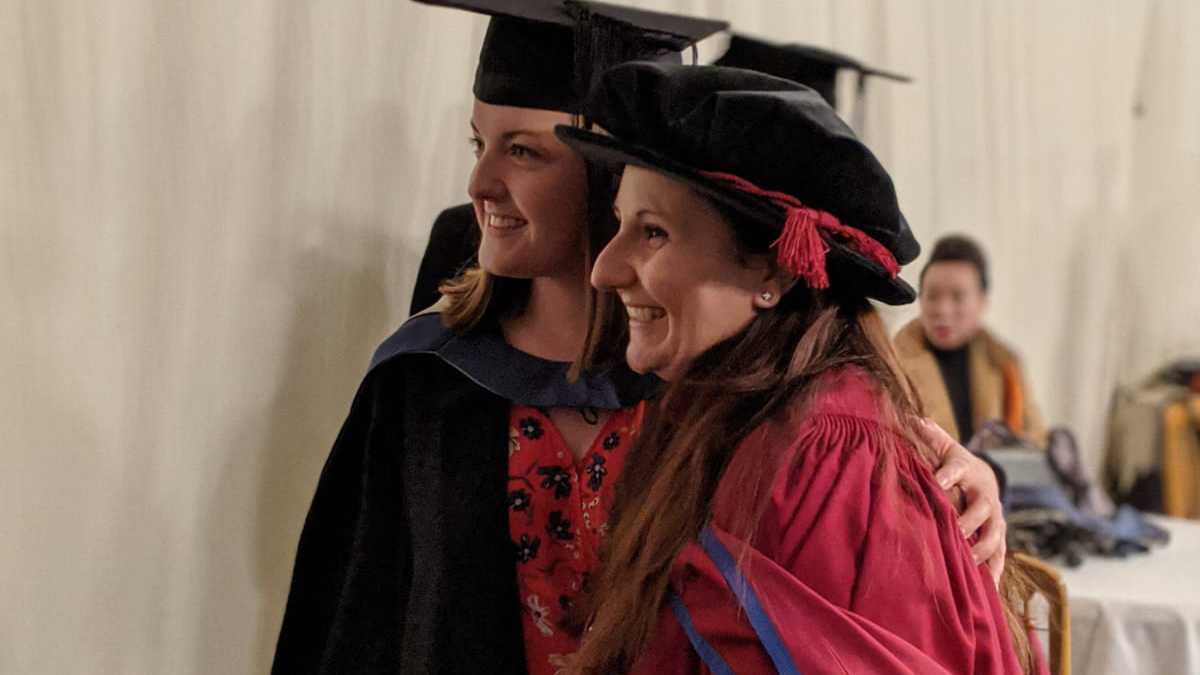"I saw that Reading did some great US history and modern history modules which appealed to me. I went to an open day and met some students and some of the brilliant lecturers. It seemed like a great department to be involved in. Very friendly and supportive. The campus also looked great in the sun that day and I could easily see myself being a student there."
A broad range of options
What really stood out about her undergraduate study for Beth was the variety of history she got to study during her time and the range of options available.
"I studied French, Italian, South Asian and American history, the crusades, slavery, museum history, science and imperialism, the rise of women, medieval women, gender in Africa and many more topics. I discovered a passion for women's history in particular."
One of the highlights of her time is the amazing people she met, especially the lecturers who were approachable, supportive, and encouraged her to pursue her passion for history and reach her potential.
Practical experience
History at Reading allows you to apply your skills to real-life contexts through various opportunities. Beth took the archives and collections placement module, undertaking a placement at the University's Special Collections.
"This was very different to any of our other modules and gave me valuable experience in an archive situation, cataloguing and indexing some collections and it was great getting to go backstage to the archive stores."
Beth also got involved in the University of Reading's Monroe Group, a research group for the study of the US presidency, as the social media and web editor for them.
"As well as creating the website, I got involved with events put on by the group at Reading including Congress to Campus and the annual American Politics Group PGR colloquium."
Building the right research skills
Beth was chosen for the University's Undergraduate Research Opportunities Programme (now called the Reading Internship Scheme) to work on a research project with Dr Mara Oliva. She spent 6 weeks during the summer researching Barack Obama's climate change rhetoric.
"This was absolutely great, and gave me a love for research! Mara was very supportive but also let me develop the project in my own way so it was a very enjoyable and valuable experience. I developed my digital research skills as well as my own independence and confidence in research and presenting. I won the best project in my category which was amazing and got to present my research at the annual British Undergraduate Research Conference in Sheffield."
Doing the project opened up lots of opportunities for Beth.
"I got to present at the annual American Politics Group conference and I have co-authored two academic articles using my research and end report. Most importantly it began a strong working relationship with my supervisor, Mara, whom I continue to do research with now, and set me on my path to my MA degree and hopefully a PhD in the future. I recommend the UROP project to anyone keen on research and looking to develop this!"
Natural progression
Beth grew to love the Department and the people so much that she wanted to continue working with Mara for her MA dissertation on women and American environmental politics.
"The support and the sense of community, as well as the research expertise at Reading meant I didn't want to go elsewhere!"
The master's advantage
The MA course offered Beth a great selection of inspiring modules to choose from. It was all mainly based on independent research/reading and discussion.
"We did a material culture module which was so different to anything else we had ever done. Instead of writing about a historical question we had to form an essay based on one specific object at the Museum of English Rural Life (MERL), which we could choose ourselves. We could present the essay as a blog or vlog. It was difficult but also fascinating and I really enjoyed it."
The dissertation project was also another highlight for Beth.
"I love research so spending about six months of the year purely researching and writing my dissertation was great! I got amazing support from my supervisor, as well as from the whole Department. They put on lots of workshops to help us with things from researching, writing an introduction or historiography, to using images or presenting our work. It never felt as though we couldn't ask for help if we were stuck. We were invited to all the research seminars in the Department and were also encouraged to go to other seminars, workshops and conferences outside of Reading too."
The next steps
Beth is currently working in publishing and credits her time at Reading for the skills she has developed.
"Mainly I think the transferable skills I learnt at Reading have helped me in this role attention to detail, good writing skills, communication, team work, critical thinking, etc. I'm told that the vlog I produced on an item at MERL as part of my MA course clinched me the job. I sent my interviewer the link to it after discussing it in my interview and she loved it."
Alumna advice
When asked to share some advice for new History students joining Reading, Beth said:
"Get involved in as much as you can and don't be afraid to step out of your comfort zone and try something different. Choose modules and subjects you're interested in. It really helps and the work and reading won't seem like a chore! Finally, don't be afraid to ask for help. The lecturers are very supportive, friendly, and want to do their best to help you succeed. "
